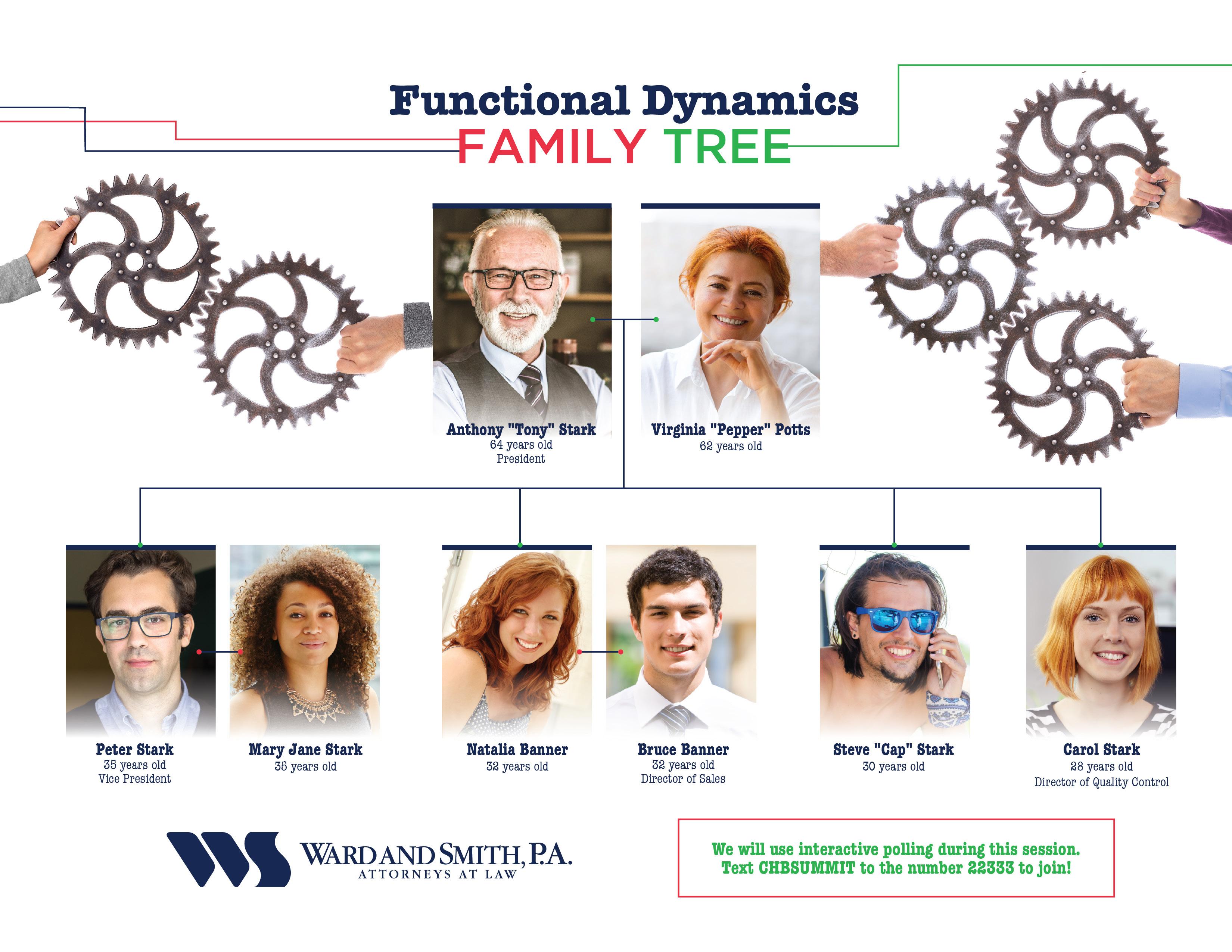Leaders of closely held businesses got an opportunity to view a family-owned enterprise as an outsider would, instead of their usual position inside a company.
Ward and Smith's 2019 Closely Held Business Summit featured a "live-action role-playing" session where audience members played along and made suggestions about what should be done in a series of situations faced by a fictional family business called Functional Dynamics.
The session was led by Ward and Smith lawyers Adam Beaudoin, a business attorney, and Devon Williams, a labor and employment law attorney. They guided summit participants through a scenario that featured tricky situations: The sudden death of the company's founder and owner, sibling conflict, sexual harassment, occupational safety law violations, and more.
Though fictional, the scenario illustrated real challenges that family-owned businesses can face.

Tragedy Strikes
The scenario opened with the founder of the 100-plus employee Functional Dynamics, Anthony "Tony" Stark, dying unexpectedly. His wife, Pepper, is the sole heir to the company, which was 100% owned by Tony. But she has no business experience and is grief-stricken.
Pepper is extremely smart, but she's grieving the death of her soulmate," Williams explained. "She is extremely vulnerable at this time."
Pepper loves all of her children — some of whom work in the company or have spouses who do — and wants to treat them all equally.
Williams and Beaudoin asked participants to consider the issues raised so far, what Pepper should do, and what ideally would have been done before Tony died. Attendees texted suggestions, which were displayed on large screens.
Many thought that Pepper and the family shouldn't navigate the situation alone. "The biggest one that we've seen come through is 'Hey, get help,'" Beaudoin said.
Participants also pointed out a glaring problem: It's not clear who's in charge of the company anymore. One suggestion: communication.
"Maybe talking to those who have had some leadership role in the company will be helpful," Williams said. Two family members — Tony's son Peter and his son-in-law Bruce — are significant leaders in the company. Peter is the vice president and was considered Tony's right-hand man, while Bruce, who's married to Peter's sister Natalia, heads up sales and is considered third-in-command by many.
But that's easier said than done. "As you'll see," Williams said, "the family dynamics get a little more dysfunctional."
Cap Takes Over
Pepper, now the company's sole owner, appoints another son — Steven, nicknamed "Cap" — president of the company.
"The trouble with Cap," Beaudoin said, "is the closest thing to business experience he has is selling grilled cheese and CBD oil out of his Volkswagen van."
Cap decides to recruit a surfing buddy — Benjamin Buchanan "Bucky" Barnes — to manage the manufacturing department. This doesn't sit well with his siblings.
The youngest of the four children, Carol, an MIT graduate and head of quality control, starts spying on Bucky.
"In the course of her spy work she discovers that Bucky has not been servicing the manufacturing equipment properly, causing several mechanical malfunctions and near misses for injuries," Williams said.
Carol pleads with Cap to fire Bucky. Instead, however, he adds quality control to Bucky's duties, "and demotes Carol to the mailroom," Williams said.
"After some more spy work, Carol discovers that Cap actually instructed Bucky that he did not need to follow the workplace safety and equipment testing and servicing guidelines because that would take the machines offline for too long," Williams said.
"Carol's upset and concerned about employee safety," Williams said. "She goes to Peter, the oldest, and threatens to go public."
The attorneys asked the audience to think through the issues involved now. Audience members came up with several, including how Carol tackled her safety concerns and Pepper's responsibilities.
Legal Options Limited
"Maybe [Carol's] approach to handling the situation was not the best way to do it," Williams said. "One suggestion might be that if she sees this, she goes, maybe to Cap but also to Peter, and says, 'Hey, we need to have a family meeting about this very serious issue that could hurt the company.'"
Pepper's fiduciary duty to the company, as the sole owner and board member, could also come up, Williams noted.
"In North Carolina, if you're a board member of a corporation or you're a manager of an LLC, you have three fiduciary responsibilities: to act with good faith, due care and loyalty to the company," Beaudoin said.
However, only shareholders can bring a breach of fiduciary duty lawsuit, and Pepper is the only shareholder, Beaudoin said. "There is no leverage, there is no minority owner to kind of champion and stifle and stymie this situation," he said.
Peter — who secretly dreams of being a photographer and doesn't like working in the family business — goes to talk to Pepper and Cap. Following the advice of his wife, an attorney who supports his photography dreams, he recommends that the family sell the company.
Family Tensions Flare
"It goes horribly wrong," Beaudoin said. "Cap says, 'No way. We're keeping the business. I'm staying president, right Mom?' She says, 'Absolutely.'"
Peter tells them they can't run the business without him, and he's going to quit. Pepper's response: "OK, now you do that, you're cut out of the inheritance. You're done. I'm going to disown you if you do that."
Beaudoin and Williams asked the audience to consider what they might have done differently in Peter's shoes. Many in the room believe that someone new — perhaps another family member who can convince Pepper to see the problems being caused by Cap, perhaps an outsider — is needed.
Williams also noted that family conflicts are probably creating other problems.
"While the company's continuing to operate, their employees are watching what leadership is doing," she said. "When they see the foundation starting to crack around them, they're looking elsewhere."
But things are about to get worse, Williams explained.
Dangerous Secrets
Bruce, the son-in-law who heads company sales, overhears the conversation between Peter, Pepper, and Cap. "He's thrilled about all the turmoil within the family," Williams said. "He has a huge ego and always thought he could run the business better than Tony."
But Bruce has other secrets: He's a serial harasser who coerces young female sales associates to sleep with him. One of those associates reported his behavior to Tony, but Tony didn't notify human resources and died before addressing the matter with Bruce.
That's not all. Bruce, Beaudoin explained, was roommates in college with Obadiah Stane, who owns Functional Dynamic's main competitor.
"[Bruce] decides, you know what, it's time to strike," Beaudoin said. "I'm going to start sharing some trade secrets, and I'm going to think about maybe joining Stane Industries."
Beaudoin adds that Bruce never signed an employment contract or a non-compete, nondisclosure or nonsolicitation agreement.
"He plots with Obadiah, 'Hey I'll come work for you, sell all the trade secrets. Functional Dynamics will be worth nothing. We'll buy it for pennies on the dollar,'" Beaudoin said.
Lessons Learned
The participants once again discussed what they could do — and what they would have done differently.
On the sexual harassment front, Functional Dynamics faces a big problem. The fact that someone reported it to Tony means the company knew about it — even though Tony didn't tell anyone else. "If the company knows and does nothing about it," Williams said, "the company is liable for sexual harassment."
Williams said every company should have a harassment policy. It should say, she said, that employees who have been harassed or know of harassment should report it human resources or "any other member of management that you feel comfortable reporting harassment to."
Bruce's bad behavior, even if reported and dealt with, won't prevent him from damaging the company in other ways.
"The company is going to be on the hook for Bruce's behavior," Beaudoin said. "But that's not going to stop Bruce from leaving and joining Stane Industries."
There may be a legal remedy if Bruce steals trade secrets, but there's still plenty of damage he could do. "He may not take trade secrets, but he may steal the customers," Beaudoin said. "And what can you do to stop that?"
Beaudoin and Williams noted some big takeaways from their scenario.
"Communication," Williams said. She noted that communication between Tony and his family before he died could have prevented many of the problems the company faced. "Communication during all of this turmoil would have helped to avoid and or mitigate the issues we saw."
Williams noted that even during the family's fighting, there still needed to be a focus on properly operating the business, such as following OSHA safety regulations.
Planning was also vital.
"If there was a succession plan, if they had thought about it, if they had brought in the third party, as we talked about, at some point previous," Beaudoin said, "a lot of these problems would have never surfaced, they would have been avoided, it would have been a smooth transition."
This is one is a series of articles summarizing insights from Ward and Smith's Closely-Held Business Summit. See additional article(s):




 />i
/>i

